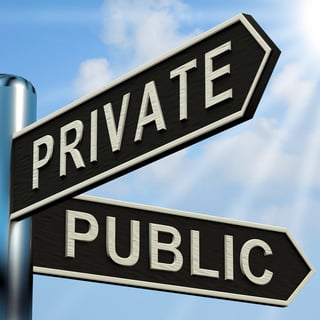
The big debate on private school vs. public school is a continuous one, where private school is often seen as the better educational option. However, there is very strong evidence that private and public schools are equally effective in fostering achievement in students (Lubeinski, Crane & Lubeinski, 2008). While they both have their advantages and disadvantages, parents should be aware that one isn’t necessarily inherently better than the other. Instead, both may have advantages that cater to the personal preferences of parents and their children. These factors will be discussed below.
Private Education
About 10 percent of students in the United States attend private schools (National Center for Educational Statistics, 2016). The benefits of private school education include smaller class sizes, higher standardized test scores, and flexible curriculums. For parents seeking religious and/or same-sex education (all-girls-schools or all-boys-schools), private schools are the best choices. In contrast to public schools, private schools normally require tuition and design their own curriculum. And while this can be advantageous, it can also pose some risks.
When choosing a private school for their children, parent should do research to ensure that the private school they are interested in provides a curriculum that they’ll be pleased with. Especially since the cost of private school can range anywhere between 5 to 20 thousand dollars per year. Since private schools are not held to the same governmental standards as public schools, they are not required to hire certified teachers and may not have appropriate programs for special needs children. So, parents should always keep this in mind.
Public Education
In contrast, roughly 50 million children enroll in public schools in the United States each year (National Center for Educational Statistics, 2016). One of the biggest advantages of public schools is the cost: they’re free. Public schools are budget friendly. In addition, some public schools, primarily charter schools, are a bit more flexible without the addition of tuition. Public schools are often more diversified, offer many extracurricular educational opportunities and most importantly, they are required to have special needs programs for students. Also, public school teachers are required to have teaching certifications, and student outcomes in academic performance are monitored by the state. Thus, public schools are held to a higher level of accountability than their private school counterparts.
One thing that parents should consider about public schools are larger class sizes. With larger class sizes, it may be harder for individual student needs to be met. Moreover, since most public schools must meet state standards, there may be an emphasis on test taking and standardized test scores, which can create a school culture that is completely focused on outcomes.
In conclusion
While parents have important choices to make regarding their children’s educations, one great thing, is that they have a numerous amount of options. Choosing private schools over public schools or vice versa, should truly be a matter of preference. Both are comparable and both foster achievement. So, there may not be a general answer to which is superior to the other, instead parents should ask themselves, which is better for my child?
Sources:
Lubienski, S. T., Lubienski, C., & Crane, C. C. (2008). Achievement differences and school type: The role of school climate, teacher certification, and instruction. American Journal of Education, 115(1), 97-138.
U.S. Department of Education, National Center for Education Statistics. (2016). Digest of Education Statistics, 2015 (NCES 2016-014), Chapter 2.





